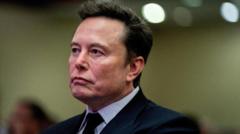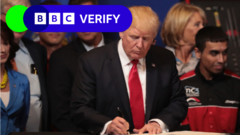Billionaire Elon Musk has shifted his support away from Nigel Farage, leader of Reform UK, after a dispute over endorsing a controversial figure, sparking discussions on the nature of political alliances and changing loyalties in populist movements.
Musk's Shift: From Supporter to Critic of Farage's Leadership

Musk's Shift: From Supporter to Critic of Farage's Leadership
In a surprising turnaround, Elon Musk publicly criticizes Nigel Farage, indicating a fracture in their once-enthusiastic alliance amidst political disagreements.
In a dramatic shift, Elon Musk, renowned billionaire and supporter of former President Donald Trump, has publicly criticized Nigel Farage, leader of the anti-immigrant Reform UK party, suggesting that he lacks the necessary qualities for leadership. This sudden about-face comes after weeks of Musk’s vocal support for Farage and his party, which has positioned itself as a solution for Britain’s challenges, especially concerning immigration.
On Sunday, Musk tweeted that “The Reform Party needs a new leader. Farage doesn’t have what it takes.” This comment starkly contrasts with Musk’s previous endorsements, throwing into question the reliability and stability of political alliances surrounding Trump’s influence.
Musk's criticism seems to stem from Farage's refusal to support the release of far-right activist Tommy Robinson, a contentious figure with a history of criminal convictions and inflammatory remarks against Islamic communities. Farage, who has distanced himself from Robinson, responded on social media by stating, “Elon is a remarkable individual but on this I am afraid I disagree. My view remains that Tommy Robinson is not right for Reform and I never sell out my principles.”
Musk’s change of stance appears to correlate with a broader trend of misinformation and divisive rhetoric concerning British politics, suggesting that he may be seeking to replicate his influence in Europe akin to his role during the 2016 US presidential campaign. The evolving relationship between Musk and Farage raises questions about the dynamics of populist politics and the fickle nature of political endorsements, especially within Trump’s sphere of influence.




















